If you're looking for the best UVC air purifiers of 2024, you'll find great options to enhance your home's air quality. The GermGuardian models, like the AC4825E and AC3000W, effectively eliminate 99.97% of pollutants, making them ideal for large rooms. The compact GG1100W is perfect for smaller spaces. These purifiers utilize advanced HEPA and UV-C technology to tackle allergens and airborne pathogens. Plus, consider factors like room size and noise levels when making your choice. Discover how these purifiers can transform your indoor environment into a safer, healthier space.
GermGuardian Air Purifier with HEPA 13 Filter (AC4825E)
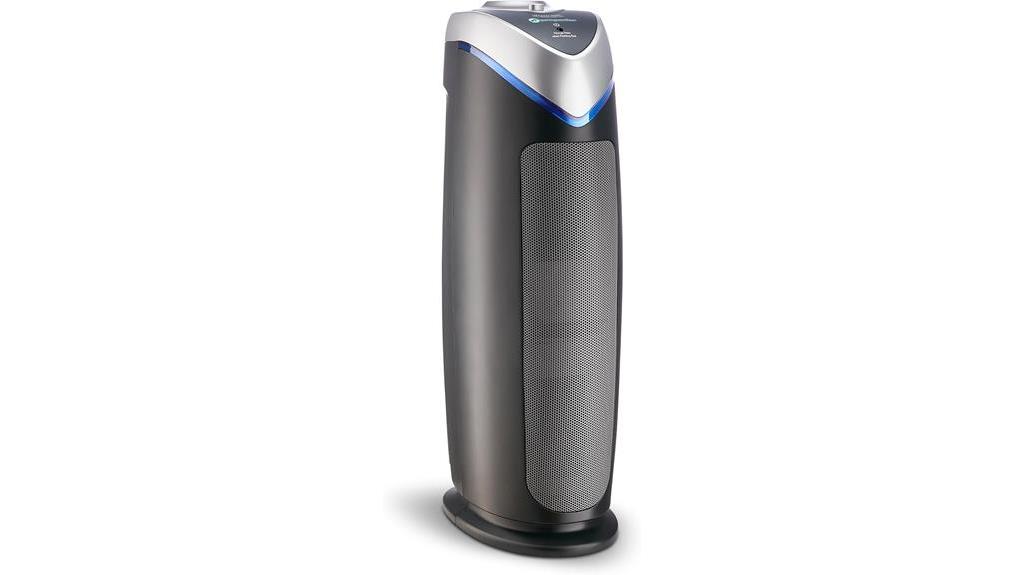
If you're looking for a reliable air purifier that can tackle allergens and improve your home's air quality, the GermGuardian Air Purifier with HEPA 13 Filter (AC4825E) is an excellent choice. This unit removes 99.97% of pollutants, making it ideal for large rooms up to 743 sq ft. The True HEPA filter captures particles as small as 0.1 microns, including dust and pet dander, while the UV-C light technology combats airborne viruses. I've noticed a significant reduction in dust and odors, and the ultra-quiet mode is perfect for nighttime use. Users rave about its easy setup and lightweight design, so moving it around is a breeze. For anyone with allergies, this purifier's performance is truly impressive!
Best For: Individuals with allergies or asthma looking for an effective solution to improve indoor air quality.
Pros:
- True HEPA filter captures 99.97% of pollutants, including allergens like dust and pet dander.
- UV-C light technology helps reduce airborne viruses and volatile organic compounds (VOCs).
- Ultra-quiet mode allows for peaceful operation during sleep or quiet environments.
Cons:
- Initial plastic smell may be noticeable but dissipates with use.
- Requires monthly filter cleaning for optimal performance.
- Limited coverage for very large spaces; multiple units may be needed for larger areas.
GermGuardian Airsafe+ Home Air Purifier (AC3000W)
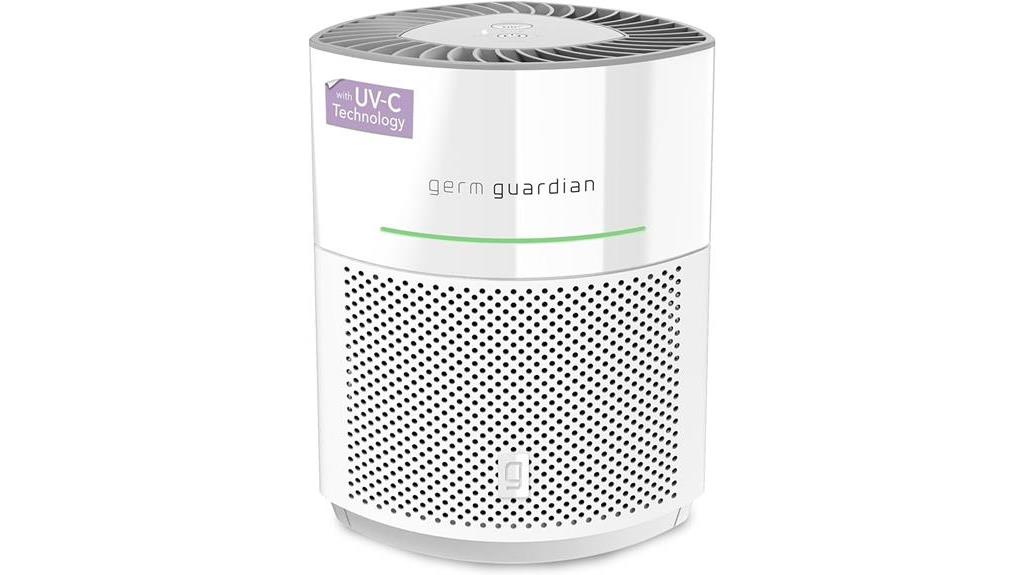
The GermGuardian Airsafe+ Home Air Purifier (AC3000W) is an excellent choice for anyone seeking a powerful solution to improve air quality in large spaces, covering up to 1040 square feet. Its 360-degree HEPA filter effectively reduces dust and allergens, while the UV-C technology targets bacteria and mold spores—completely ozone-free. I appreciate the Intellisense air quality indicator that adjusts the fan speed as needed, ensuring ideal air purification. Users rave about its quiet operation and stylish design, making it a great fit for any room. Plus, the EcoMode is energy-efficient, switching to low speed when the air quality is good. Overall, it's a reliable purifier that delivers noticeable results, especially for homes with pets.
Best For: Those looking to improve air quality in large spaces, particularly in homes with pets or allergy sufferers.
Pros:
- Effective air purification with 360-degree HEPA filter and UV-C technology.
- Quiet operation and stylish design suitable for various room aesthetics.
- Energy-efficient EcoMode that adjusts fan speed based on air quality.
Cons:
- Initial chemical off-gassing reported by some users.
- Minor annoyance with the setting interface requiring multiple clicks for adjustments.
- New plastic smell upon first use, typical of new air purifiers.
GermGuardian Air Purifier with HEPA 13 Filter (AC5900WCA)
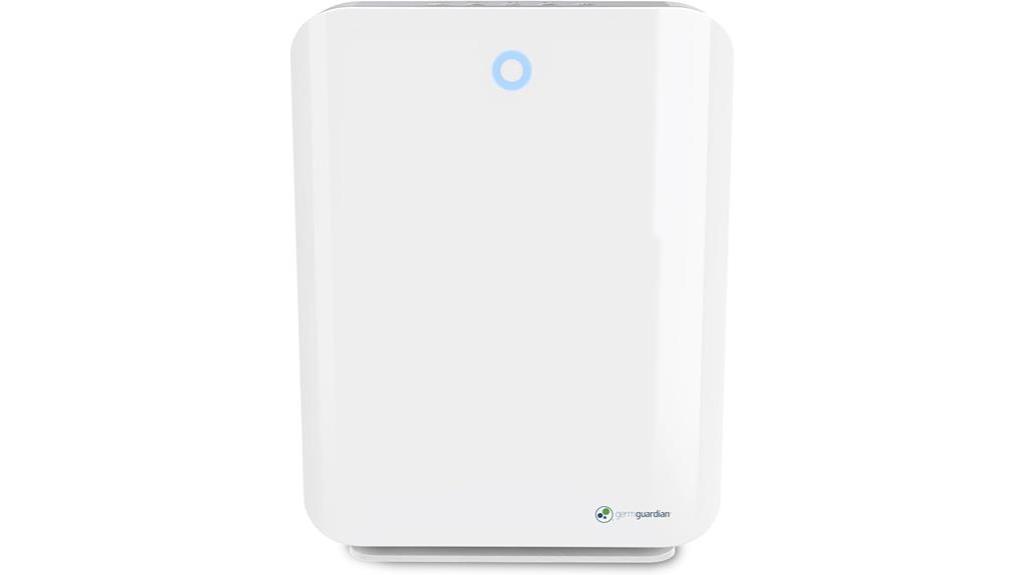
For anyone looking to improve their indoor air quality, the GermGuardian Air Purifier with HEPA 13 Filter (AC5900WCA) stands out as an excellent choice. It effectively removes 99.97% of pollutants, including germs, dust, and pet dander, even those as small as 0.1 microns. It circulates air in large rooms, making it perfect for bedrooms or living areas. The combination of True HEPA filtration and UV-C light technology guarantees a significant reduction of airborne viruses and allergens. Plus, its activated charcoal filter helps tackle odors from smoke and pets. With user-friendly controls and a sleek design, this purifier not only enhances air quality but also fits seamlessly into your home decor.
Best For: Individuals seeking a reliable air purifier to effectively reduce allergens, odors, and airborne viruses in large rooms.
Pros:
- True HEPA filtration captures 99.97% of allergens and pollutants.
- User-friendly controls with multiple speed settings and an auto-off timer for convenience.
- Sleek design that complements home decor while being easy to maintain.
Cons:
- Higher replacement filter costs compared to some competitors.
- Noise level can be noticeable on higher speed settings.
- Initial investment may be steep for budget-conscious consumers.
GermGuardian Air Purifier with HEPA 13 Filter (Covers Large Rooms)
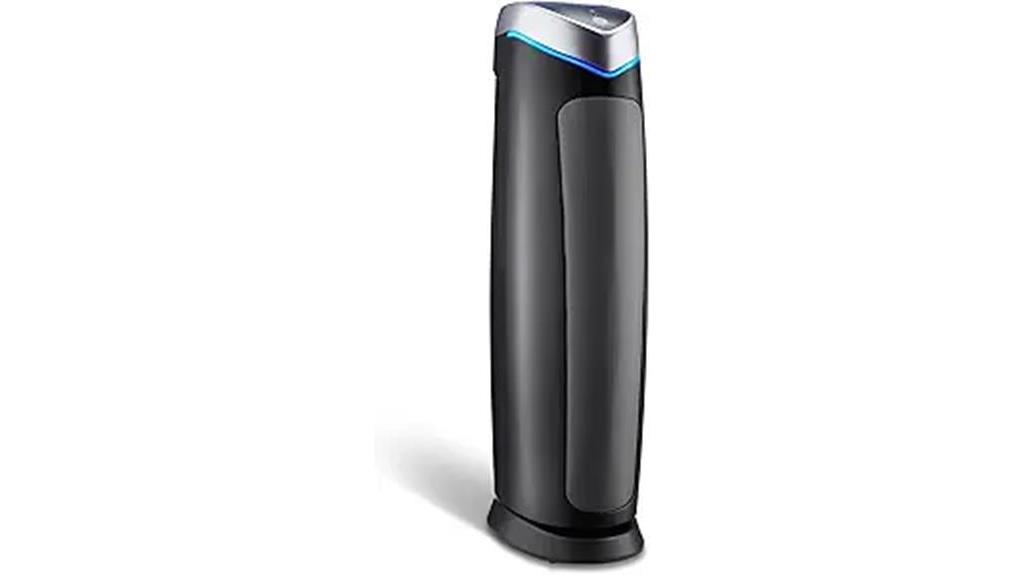
Looking for an effective air purification solution for larger spaces? The GermGuardian Air Purifier with a HEPA 13 filter is a fantastic choice. It removes 99.97% of pollutants like germs, dust, and pet dander, making it ideal for rooms up to 915 sq. ft. With its UV-C light feature, it helps reduce airborne viruses and VOCs. I love the digital display and filter change indicator, which keeps maintenance straightforward. Plus, it has five fan speeds, from high allergen control to ultra-quiet sleep mode. Users often rave about the significant reduction in allergens and odors, especially in homes with pets. Overall, this air purifier is a solid investment for cleaner air and improved health.
Best For: This air purifier is best for households with pets and allergy sufferers seeking to improve indoor air quality in larger spaces.
Pros:
- Effective filtration: Removes 99.97% of pollutants including allergens, germs, and odors.
- Versatile coverage: Suitable for large rooms up to 915 sq. ft., enhancing air quality in various living spaces.
- Multiple fan speeds: Offers five fan settings, allowing users to customize performance from high allergen control to ultra-quiet operation.
Cons:
- Operational noise: Can be noisy at higher fan settings, which may disturb some users.
- UV-C safety concerns: Caution is advised regarding the UV-C light feature due to potential hazards.
- Filter replacement costs: Genuine filter replacements can be expensive, impacting long-term maintenance costs.
Germ Guardian Pluggable Small Air Purifier (GG1100W)
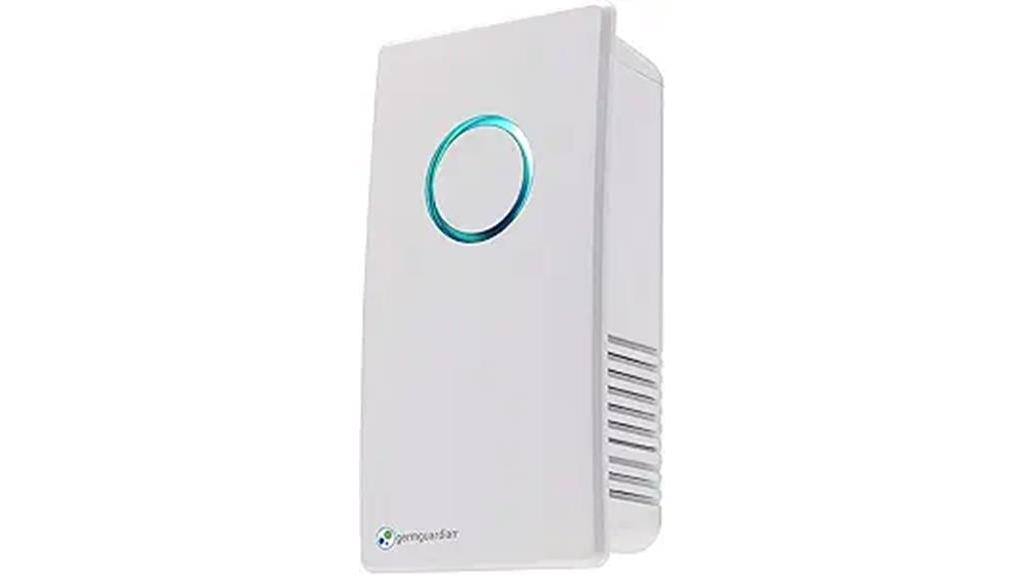
Compact and efficient, the Germ Guardian Pluggable Small Air Purifier (GG1100W) shines as an excellent choice for those seeking cleaner air in tight spaces like kitchens or bathrooms. Its compact design fits perfectly in standard wall sockets without blocking other outlets. Utilizing UV-C light, it effectively kills airborne viruses and reduces odors from pets, smoke, and mold. I've noticed significant improvements in air quality, especially in areas with litter boxes. The unobtrusive noise level, akin to a computer fan, makes it easy to forget it's even there. Plus, with no filter replacements needed—just the UV-C bulb every 10-12 months—it's low maintenance. Priced around $20 to $25, it offers great value for cleaner air.
Best For: Those looking for a compact air purifier to improve air quality in small spaces like kitchens, bathrooms, or pet areas.
Pros:
- Compact design fits standard wall sockets without blocking other outlets.
- Utilizes UV-C light for effective reduction of airborne viruses and odors.
- Low maintenance with no filter replacements needed, only a UV-C bulb every 10-12 months.
Cons:
- May have limitations in removing strong cooking odors like onions and garlic.
- Some users report a shorter bulb lifespan than the expected 5,000 hours.
- Effectiveness may vary, with mixed reviews on strong odor removal capabilities.
Factors to Consider When Choosing UVC Air Purifiers
When choosing a UVC air purifier, you need to take into account a few key factors to guarantee you get the right fit for your space. Think about the room size compatibility, the types of filtration technology available, and how noisy the unit might be. You'll also want to assess maintenance requirements and the effectiveness of the UV-C light in eliminating pathogens.
Room Size Compatibility
Choosing the right UVC air purifier hinges on understanding room size compatibility. When you select a purifier, make certain it's designed for the specific square footage of your room, as units are often rated for different coverage areas. For instance, some purifiers can effectively handle spaces up to 1,040 sq. ft., while others are better suited for smaller rooms.
Consider the air changes per hour (ACH) rate, as this notably impacts air quality. A purifier rated to circulate air multiple times per hour in a smaller room will enhance your indoor environment more effectively. Look for devices that specify their coverage capabilities for both large areas, like 743 sq. ft. at 1x/hour, and smaller spaces, such as 189 sq. ft. at 4.8x/hour.
Additionally, evaluate the design of the purifier. Some models offer 360-degree filtration, allowing for better air circulation in larger rooms. Finally, check the specifications to confirm the purifier effectively targets pollutants relevant to your space. By considering these factors, you'll choose a UVC air purifier that meets your needs for cleaner, healthier air.
Filtration Technology Types
Often overlooked, the type of filtration technology used in UVC air purifiers plays a significant role in their overall effectiveness. UVC purifiers utilize ultraviolet light to destroy airborne pathogens, like bacteria and viruses, providing an additional layer of purification beyond traditional methods. When choosing a UVC air purifier, you'll encounter various filtration technologies, with True HEPA filters being a standout option. These filters can capture 99.97% of particles as small as 0.1 microns, ensuring your air is cleaner.
Activated carbon filters are another essential component, as they help reduce odors and volatile organic compounds (VOCs). Some units combine multiple filtration technologies, such as pre-filters, which capture larger particles, enhancing overall efficiency.
It's important to evaluate the effectiveness of UVC light in these purifiers, particularly its ability to reduce specific pathogens like Staphylococcus Albus and Escherichia Coli. Finally, consider ozone emissions; some UVC units may produce ozone, which can be harmful in indoor spaces. By understanding these filtration technologies, you'll be better equipped to choose the right UVC air purifier for your needs.
Noise Level Considerations
Noise level is a significant factor to keep in mind as you evaluate UVC air purifiers. Many models operate at sound levels around 45 dB on low settings, which is comparable to a quiet computer fan. If you're sensitive to noise, this is essential since higher fan speeds typically generate more sound. Look for purifiers that offer multiple speed settings, allowing you to balance air purification efficiency with acceptable noise levels.
Consider models with a "night mode." This feature reduces fan speed and noise, making them suitable for use in bedrooms while you sleep. The design of the air purifier also plays a role; some are engineered for quieter operation through better airflow management.
User reviews often emphasize the importance of low noise levels, especially in home environments where peace and quiet are priorities. When shopping, pay attention to the sound ratings and user feedback. Choosing a UVC air purifier with the right noise level can enhance your comfort and make the air-cleaning experience more pleasant in your living space. So, be mindful of how these factors align with your lifestyle needs.
Maintenance and Replacement
When evaluating UVC air purifiers, maintenance and replacement are key factors that can greatly influence their effectiveness and longevity. Regular maintenance is essential—cleaning the filters monthly will help you guarantee peak performance and better air quality.
You should also be aware of the UV-C bulb's lifespan, which typically requires replacement every 10-12 months, depending on usage. Some models simplify this process, relying solely on the UV-C bulb without filter replacement needs, reducing your maintenance responsibilities. However, keep an eye on the bulb's performance, as average lifespans hover around 5,000 hours but can vary.
When replacing parts, it's vital to use genuine replacement components. Using third-party options might save you a few bucks initially, but it can compromise the purifier's efficiency and effectiveness. Always check the manufacturer's recommendations for replacements to guarantee compatibility and peak performance.
UV-C Effectiveness
Understanding the effectiveness of UV-C air purifiers is vital for making an informed choice. UV-C light technology excels at reducing airborne viruses, including influenza and rhinovirus, by disrupting their DNA, which prevents replication. Studies demonstrate that UV-C can eliminate up to 99.9% of specific bacteria and mold spores in the air, but this requires adequate exposure durations.
To maximize effectiveness, look for models that combine UV-C light with HEPA filters. While the HEPA filter captures larger particles, the UV-C light targets smaller pathogens more efficiently, enhancing overall air purification. It's also important to choose ozone-certified UV-C purifiers. This certification guarantees that the device doesn't produce harmful ozone as a byproduct, which can be detrimental to your health.
Keep in mind that UV-C bulbs typically need replacement every 10-12 months. Their effectiveness diminishes over time, so regular maintenance is key to ensuring peak performance. By considering these factors, you'll be better equipped to select a UV-C air purifier that meets your needs, helping you breathe cleaner and healthier air in your home.
Energy Efficiency Ratings
Choosing a UV-C air purifier involves more than just evaluating its effectiveness; energy efficiency plays a crucial role in long-term satisfaction and cost savings. When you look at energy efficiency ratings, you'll want to check the power consumption relative to the amount of air filtered, typically measured in watts per hour or annual energy costs. Many models come with Energy Star certifications, meaning they meet stringent energy efficiency guidelines set by the U.S. Environmental Protection Agency.
The Energy Efficiency Ratio (EER) is another important metric to take into account. A higher EER indicates greater efficiency and lower energy usage, which can lead to lower electricity bills. Also, think about the average daily runtime of the unit; if it runs continuously, it can greatly impact your monthly expenses.
Additionally, some UVC air purifiers feature EcoMode settings that automatically adjust energy consumption based on air quality. This functionality helps optimize energy usage without compromising performance. By focusing on these energy efficiency aspects, you can ascertain that your investment in a UV-C air purifier is both practical and economical in the long run.
Safety Features Included
Safety should be a top priority when selecting a UV-C air purifier. Look for models with automatic shut-off mechanisms that deactivate the unit if the cover is removed or if it tips over. This feature considerably reduces the risk of UV exposure to you and your loved ones.
Additionally, many UVC air purifiers come equipped with protective shields or enclosures, guaranteeing that while they effectively eliminate airborne pathogens, they also limit direct exposure to UV-C light. Some advanced models even incorporate sensor technology that monitors air quality and adjusts the UVC light intensity accordingly, enhancing both effectiveness and safety.
It's essential to choose ozone-certified purifiers that don't release harmful ozone, as this can adversely affect lung health. Finally, opt for units with user-friendly controls that clearly indicate when it's time to change filters or replace UV-C bulbs. This guarantees your device operates effectively while minimizing exposure to potentially harmful emissions. By prioritizing these safety features, you can breathe cleaner air with peace of mind, knowing you've made a safe choice for your environment.
Frequently Asked Questions
How Often Should I Replace the Filter in UVC Air Purifiers?
You should replace the filter in your UVC air purifier every 6 to 12 months, depending on usage and the environment. If you notice decreased performance or an increase in dust and allergens, it's a good idea to check the filter sooner. Regular maintenance not only keeps your air cleaner but also extends the lifespan of your purifier. Always refer to the manufacturer's guidelines for specific recommendations related to your model.
Do UVC Air Purifiers Produce Ozone?
Ozone origins often overshadow UVC air purifiers, but you'll be pleased to know that many modern models are designed to minimize ozone production. While some UVC purifiers can emit small amounts of ozone, it's usually below harmful levels. To guarantee safety, check the product specifications before purchasing. Prioritizing purifiers that meet stringent ozone safety standards can help you breathe cleaner, fresher air without the worry of excess ozone in your home.
Are UVC Air Purifiers Safe for Pets?
UVC air purifiers can be safe for pets, but it's important to take into account a few factors. The intensity of the UVC light should be low enough not to harm your furry friends, and you should verify they're not in the direct path of the light. It's also wise to choose models that minimize ozone production, as high ozone levels can be harmful. Always monitor your pets' behavior and consult your vet if you have concerns.
Can UVC Air Purifiers Remove Odors Effectively?
Imagine a diligent gardener, tirelessly tending to their plants, ensuring every leaf flourishes. Just like that gardener, UVC air purifiers work hard to eliminate odors. They don't just mask smells; they tackle the source, breaking down odor-causing particles using ultraviolet light. You'll find that these purifiers can effectively refresh your indoor air, creating a cleaner environment. So, if you're seeking relief from persistent odors, a UVC air purifier could be your trusty companion.
What Is the Average Lifespan of a UVC Bulb?
The average lifespan of a UVC bulb typically ranges from 9,000 to 12,000 hours. This means you can expect it to last for about a year or two, depending on usage. To maintain peak performance, you should check the manufacturer's recommendations for replacement. Regularly monitoring the bulb's effectiveness is essential, as a dimming light can indicate it's time for a change to guarantee you're getting the best air purification possible.
Wrapping Up
So, there you have it—the top five UVC air purifiers of 2024, ready to zap those pesky germs while you binge-watch your favorite shows. Who knew cleaning the air could be so high-tech? Just imagine, your air could be fresher than a mountain breeze, all while you sit on your couch in your pajamas. Remember, folks, if you can't trust a device that promises to eliminate 99.9% of germs, what can you trust? Your cat?

Hi, I’m Charlie, and I cover all things laundry here at Appliance Mastery.
I’ve spent over eight years working on washing machines, dryers, and dishwashers. I also have a degree in mechanical engineering, which helps me understand how these appliances really work.
I try to make every guide clear and practical. If you’re stuck with a noisy dryer or a leaking washer, I’ll help you figure out what’s wrong and how to fix it.
